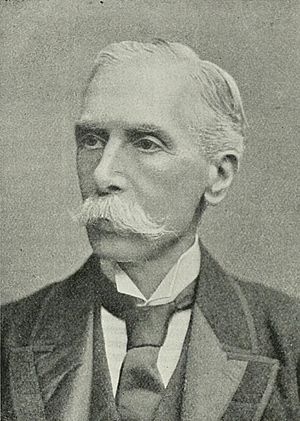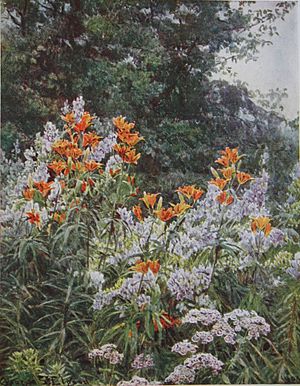Alfred Austin facts for kids
Quick facts for kids
Alfred Austin
|
|
|---|---|

Alfred Austin, by Langfier, 1900.
|
|
| Poet Laureate of the United Kingdom | |
| In office 1 January 1896 – 2 June 1913 |
|
| Monarch | Victoria George V |
| Preceded by | Alfred, Lord Tennyson |
| Succeeded by | Robert Bridges |
| Personal details | |
| Born | 30 May 1835 Headingley, Yorkshire, England |
| Died | 2 June 1913 (aged 78) Ashford, Kent, England |
| Spouse | Hester Jane Homan-Mulock |
| Occupation | Poet, novelist, dramatist |
Alfred Austin (30 May 1835 – 2 June 1913) was an English poet. He became the official Poet Laureate in 1896. This important role meant he was the poet for the King or Queen. He got the job after the famous poet Tennyson died. Some people thought he was chosen because he supported the Conservative political leader, Lord Salisbury. Today, most of Austin's poems are not widely remembered. His most popular writings were about nature.
Contents
Who Was Alfred Austin?
Alfred Austin was born in Headingley, near Leeds, England, on 30 May 1835. He came from a Roman Catholic family. His father, Joseph Austin, was a merchant. His mother was the sister of Joseph Locke, a well-known engineer and Member of Parliament.
Alfred's Education and Early Career
Alfred went to school at Stonyhurst College and St Mary's College, Oscott. He then studied at the University of London, finishing in 1853. In 1857, he became a barrister, which is a type of lawyer. However, he later received money from his uncle. This allowed him to leave his law career and focus on writing.
His Political Life
Austin was a strong supporter of the Conservative Party. He tried to become a Member of Parliament twice but was not successful.
From 1866 to 1896, Austin worked as an editor for the National Review. He also wrote important articles for The Standard newspaper. He was a foreign affairs reporter for The Standard. This meant he traveled to important events around the world. For example, he reported from the Vatican in 1870. He also reported from the headquarters of the King of Prussia during the Franco-Prussian War in 1870. In 1878, he attended the Congress of Berlin, a big meeting of European leaders. There, he even met the German Chancellor, Otto von Bismarck.
Austin was a strong believer in the British Empire. He admired Benjamin Disraeli, a former Prime Minister.
Becoming Poet Laureate
When Tennyson died in 1892, the position of Poet Laureate became empty. It took several years to choose a new one. Many poets were considered. Eventually, in 1896, Alfred Austin was chosen. Another famous poet, William Morris, had turned down the job.
Many people at the time did not think Austin was a great poet. Some even made fun of his poetry. Critics like Edmund Broadus suggested that Austin's friendship with Lord Salisbury helped him get the job. His work as an editor and writer, and his willingness to support the government with his poems, also played a role. For example, he wrote a poem called "A Vindication of England." This poem defended the government's actions regarding Armenia.
Alfred Austin died on 2 June 1913, at his home in Ashford, Kent, England.
Alfred's Family Life
On 14 November 1865, Alfred Austin married Hester Jane Homan-Mulock in London. His wife was a great help and support to him throughout his career as a writer and journalist. She passed away on 23 September 1929.
Alfred's Poetry and Writings
Alfred Austin started his writing career with poetry and stories. In 1861, he published The Season: a Satire. This book showed his cleverness and observation skills.
In 1870, he published a book of criticism called The Poetry of the Period. In this book, he strongly criticized famous poets like Tennyson, Browning, Matthew Arnold, and Algernon Charles Swinburne. He called Robert Browning's writing "detestable gibberish." He also said that Tennyson's famous poem In Memoriam would be forgotten. Austin later admitted that his tone in the book was "unfortunate." He even stopped its circulation in 1873.
However, some critics praised Austin's writing style. Walter Whyte said Austin wrote "sound unaffected English." He also noted that Austin's descriptions of nature were "fresh and vivid." He especially liked Austin's pictures of English fields and woods.
Another critic, George Saintsbury, said that while Austin might not have deserved to be Poet Laureate, he was a "vigorous and accomplished writer of prose." He also said Austin was good at writing poems of some length.
As Poet Laureate, Austin wrote poems about current events. One poem he wrote in 1896, praising the Jameson Raid, received negative comments. He also wrote a play called Flodden Field, which was performed in 1903. Some of his poems were turned into songs by composers like Frances Allitsen and Alexander Mackenzie.
See also
 In Spanish: Alfred Austin para niños
In Spanish: Alfred Austin para niños
 | Leon Lynch |
 | Milton P. Webster |
 | Ferdinand Smith |


